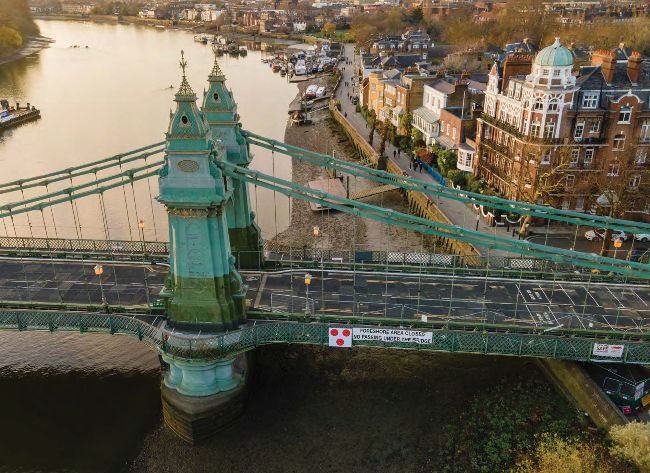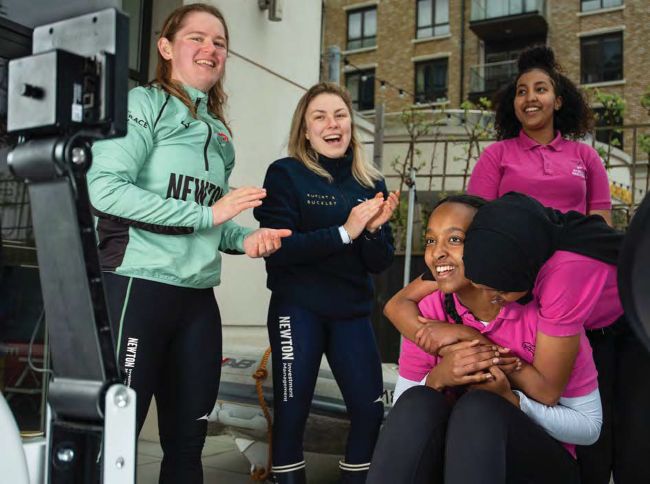Blues Give Back
Oxford and Cambridge rowers work towards a brighter, more inclusive future for rowing
WORDS: RACHEL HALLIBURTON / PHOTOGRAPHY: FRBC
When teenagers from local state schools returned to Fulham Reach Boat Club after lockdown this June, Steve O’Connor and his staff were struck by the difference in their behaviour. The children had joined the boat club through the charity O’Connor set up six years ago to challenge stereotypes about rowing being a sport for the privileged. One of the most exciting aspects of the project was observing that beyond learning to row, many of the children had developed both confidence and a sense of motivation by spending time out on the water. By contrast, time locked up indoors without being able to socialise had produced the opposite effect.
‘For me, lockdown has underlined the importance of physical activity,’ O’Connor asserts over the phone. ‘It seemed that a lot of the children had spent the best part of three months in their bedroom. Coaches were saying that a lot of them were finding it harder to engage and in some cases even talk. So we focused on being supportive and welcoming and making sure we provided a nice environment. After a month or so we were back to the enthusiastic screaming and shouting.’

A currently closed Hammersmith Bridge, near Fulham Reach Boat Club.
More than fifty miles up the Thames, students at Oxford University were also struggling with negotiating how to live during a global pandemic. Since they were a little older, a conversation developed about how to engage with other communities tackling the crisis. ‘We figured out that we had to do something,’ says Alex Bebb, the Canadian President of Oxford University Boat Club. ‘We wanted to implement real change, both for other people’s sake and for our sake as individuals.’
The result was a fundraising event in which four college boat clubs from Oxford competed to see who could raise the most money for O’Connor’s charity, and thereby help teenagers looking for training at the Fulham Reach Boat Club. Eight teams of nine athletes were challenged to clock as many miles as possible through running, cycling or erging. ‘The money we raised was to cover training costs for eight athletes from the BME community in an event staged over one weekend,’ Bebb declares. ‘We managed to pick the hottest weekend of the summer. ‘I did 50km straight through on the erg. I was absolutely dead at the end of it.’
The fundraising target was £4K, but to the team’s amazement they managed to raise £6K. As a consequence Fulham Reach Boat Club, working closely with Oxford students, has now set up eight scholarships for juniors from the BME community to row for a year, as well as to build relationships with the Oxford boat clubs. ‘It’s all about breaking through the myth that rowing is just for a privileged part of the community,’ says O’Connor. ‘We realised there’s chronic underrepresentation of the BME community in the sport and knew that positive action needed to be taken to do something about it. Beyond rowing, we want these children to have positive experiences and build a connection with people who can show them the opportunities doing something like this can open up.’
"Rowers wanted to do something that would help others and smash through the stereotype that rowing was just about privilege.”
At Cambridge University too, rowers in lockdown felt that they wanted to do something that would simultaneously help others and smash through the stereotype that rowing was just about privilege. It has been a particularly important year for Cambridge rowing, because on August 1 the university’s three clubs - Cambridge University Boat Club, Cambridge University Women’s Boat Club, and Cambridge University Lightweight Rowing Club became one new inclusive club. The significant implication of this is that all resources will now be shared equally. It was as part of the conversation around this that the rowers decided they wanted to help break down barriers further afield.
Caoimhe Dempsey was going to row in the Blue boat in this year’s cancelled Boat Race. She arrived at Cambridge after learning to row at Trinity College, Dublin. She declares frankly, ‘I wouldn’t have come to Cambridge if it hadn’t been for rowing. It would just never have occurred to me that I might be the kind of person who would get here.’ When she talked to her fellow rowers, one was Callum Sullivan, who first took to the water under the supervision of the organisation London Youth Rowing (LYR), which works with children from all backgrounds across the city to promote health and opportunity. It changed his life: along with rowing he gained a new sense of focus which enabled him to achieve the grades that eventually got him into Cambridge.

It didn’t take long for them to decide that this was the organisation that Cambridge wanted to support. I call Matt Rostron, who joined LYR as a volunteer in 2006, two years after it had been set up by Jim Downing, and ended up becoming its CEO. At its height the organisation worked with up to ten thousand young people in a year; its current target is eight thousand, though obviously this year numbers have been reduced. Rostron talks to me about LYR’s work with Moss-bourne Academy in Hackney - a former failed state school, ‘We wanted to set up a project that was like a fee-paying private rowing programme within a state setting.’
As a result, rowing at Mossbourne Academy has become an integral part of its vibrant confident culture. When Cambridge said it wanted to fundraise for LYR, Rostron decided the money would go towards this programme, though for him what was equally significant was enabling the children to engage directly with the Cambridge students. An event was organised, based on LYR’s ‘Race the Thames’ model in which teams from both Hackney and Cambridge competed to notch up the kilometres on ergs.
The money raised - £1K - will provide a vital injection for the Mossbourne programme. But what’s striking, talking to both Rostrom and Dempsey, was that the human investment was, in Dempsey’s words, ‘almost more important. We had a big Zoom session with the students on the last day of the event,’ she says. ‘They submitted a whole lot of questions beforehand, about what the training was like, what the difficulties were, where rowing might lead to.’ Rostron laughs, as he recalls what happened. ‘It took them a couple of minutes to warm up, and then it really took off. What was amazing for so many of them was to realise that students at Cambridge had some of the same problems they do.’
‘We’re going to build on that now,’ he continues, ‘one of the things we’ll use the money for is to take the kids out of Hackney for a few days and get them rowing on the Cam.’ Dempsey is equally enthusiastic about the connection continuing. ‘We don’t want it to be a one-off event. So many of us feel that rowing got us to places we never imagined reaching, and it’s great to be able share that message.’